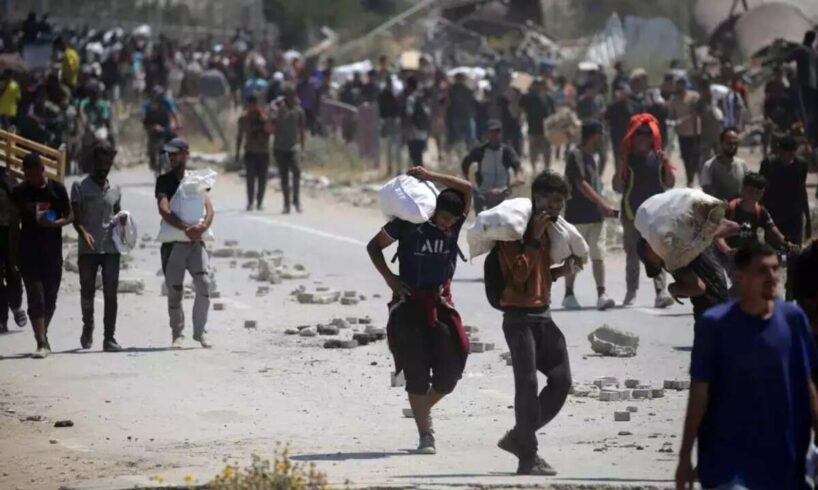
Until the end of last year, then US President Joe Biden and his administration were in office, and they placed numerous obstacles in Israel’s path to concluding the war in Gaza and defeating fundamentalist Islam on favorable terms. Biden restricted the delivery of essential military aid; tanks fired only training shells, artillery was unable to provide suppressive fire, and aircraft dropped bombs that only partially protected ground troops. On the diplomatic front, Biden – particularly the State Department – sought to limit Israel’s military action and forced it to allow massive aid shipments, most of which ended up in the hands of Hamas.
The first dramatic change came with Donald Trump’s election to the US presidency. It gave Israel and Prime Minister Benjamin Netanyahu wide latitude to act as they saw fit in Gaza. Trump demanded victory, and he got it, even joining the effort against Iran in June. But fighting Hamas guerrillas has proven far more complicated.
Until February, the IDF were led by Chief of Staff Lt. Gen. Herzi Halevi, who faced criticism for not being aggressive enough and for a strategy of conquest, withdrawal, and raids that many saw as insufficient. In February, Lt. Gen. Eyal Zamir took over, immediately revised operational plans, appointed the notably aggressive Maj. Gen. Yainiv Assor as head of Southern Command, and launched a broad offensive with new tactics that yielded significantly better results. But even those results, across nearly the entire defense establishment, are close to the best achievable without jeopardizing the lives of the hostages, a risk some believe is worth taking.
Netanyahu: “We must allow minimal humanitarian aid into Gaza”. Photo: Kobi Gideon / GPO
A psychological victory for Hamas
With Biden and Halevi out and Trump and Zamir in, the Israeli government was given all the tools to change the reality in Gaza and achieve a military and diplomatic outcome that could partially erase the shame of October 7 and reshape the political landscape, both locally with the Palestinians and regionally in the Middle East. This was achieved against Iran and even Hezbollah, but not against Hamas, the weakest of the three. The final victory remains elusive and seems to be slipping further away. The straightforward answer as to why is the presence of hostages held by the terrorist organization, which disregards the suffering of its people and the destruction in the Strip, acting solely to ensure its own survival.
Hamas has become a regional nuisance. Most Arab states have turned their backs on it, as has the Palestinian Authority, which is demanding it disarm and release the hostages, just like Israel. Remarkably, Hamas has already been nearly defeated militarily.
When the world sees the images from Gaza. Photo: AP
A major reason for the ongoing problem is the treatment of Gaza’s displaced population. The early “let them starve until they return the hostages” policy during Operation Iron Swords could not withstand international pressure, or Israel’s own moral standards. It also proved ineffective, as Hamas has long-term supply stockpiles, doesn’t care about its population, and puts the hostages at even greater risk.
The GHF humanitarian aid fund, initially seen as a game-changer, has only partly succeeded and has created new complications. It is currently preventing famine in southern Gaza by distributing millions of meals amid chaos. But the UN, which opposes GHF and openly cooperates with Hamas, launched a work slowdown in distributing the food it controls. Combined with the closure of distribution centers and residents’ refusal to evacuate some Gaza neighborhoods, this has created acute hunger in northern Gaza.
Hamas exploited the situation brilliantly. It used sympathetic media outlets like Al Jazeera, and even some international and Israeli media, to dominate the psychological battlefield. In recent days, the Prime Minister’s Office has been flooded with calls from friendly leaders and Jewish community heads worldwide, demanding answers and action.
Holding the line. IDF troops in the Gaza Strip. Photo: IDF Spokesperson’s Unit
Significant concessions on the horizon
The political echelon, namely Netanyahu, is responsible for this situation. Despite clear military victories on several fronts, including in Gaza, Israel has struggled to convert them into the release of hostages or a comprehensive solution for Gaza. The coalition’s makeup is one reason. The far right, including factions within Likud, refuses to hand control of the Strip to any external entity, and no such entity is willing to take over unless Hamas disarms. Some in this camp aim to reestablish Israeli settlements in Gaza and encourage the (voluntary) emigration of Palestinian residents. This vision limits negotiations with both the international community and Hamas. However, sources suggest a shift may be underway in the Prime Minister’s Office.
Retired Maj. Gen. Eliezer “Cheney” Marom argues that Israel erred by trying to manage Gaza’s humanitarian needs and failed. He blames right-wing coalition ministers for blocking past efforts to resolve the issue through local leadership, a model that is currently working well in Rafah, where the al-Shabab clan has managed to establish a calm zone with IDF support and no supply problems. “We won militarily; now we need to push for a resolution and the release of all hostages, hand over management to a multinational administration with Israeli involvement, and drop the unrealistic demand to demilitarize Gaza. We’ll deal with Hamas later,” Marom said.
The Prime Minister’s Office does not believe Hamas will meet even Israel’s minimum demands to end the war, which is why it is now considering an interim deal involving the release of about half of the living hostages. A significant shift has taken place: a willingness to make substantial concessions as part of such a deal, and possibly to move toward ending the war. A senior source told me that key US and Arab guarantees have been provided that would enable such compromises and potentially pave the way for a final arrangement. Whether the three-month Knesset recess will allow this to materialize remains to be seen.





